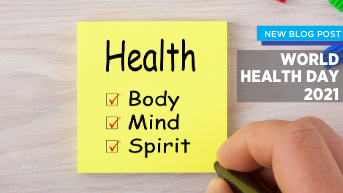World Health Day 2021
Health is a birthright, but many children are born without it because our world is an unequal one. COVID-19 has highlighted that some people are able to live healthier lives and have better access to health services than others largely due to the conditions in which they are born, grow, live, work and age. The World Health Day, celebrated on April 7 of each year, is held to mark the anniversary of the World Health Organization’s (WHO) founding and is seen as an opportunity to draw worldwide attention to a subject of major importance to global health annually. This year, as the ever-present Covid-19 virus mutates and vaccination programs are happening in earnest across the world, the theme is “Building a fairer, healthier world for everyone.”
The WHO defines health as “a state of complete physical, mental and social well-being and not merely the absence of disease or infirmity." Health is also often thought of in terms of illnesses which endanger it like AIDS, Malaria and Tuberculosis, three of the most devastating diseases. When an illness or disease affects the lives of large proportions of people it is called an epidemic. When an illness or disease extends over regions and countries it is called a pandemic. Health is a shared responsibility, which means ensuring equal access to essential healthcare and taking collective action to health threats in looking after those that are sick is vital. This helps to prevent the spreading of diseases in different countries in a world where as many as two billion people face health threats every day.
The way the body works depends on a person’s health as the body is designed to deal with everyday obstacles in order to be able to live a full life. Poor health makes these everyday obstacles become larger and more difficult to overcome and for some, the odds of leading a healthy life are stacked against them from the start. Health is important to everything a person does but poor health affects people differently and not only affects one person, but has knock-on effects for others. Healthy children become healthy adults growing into people who create better lives for themselves, their communities and their countries. Good health therefore encourages tremendous benefits for a more promising future for richer and poorer countries alike.
From its inception at the First Health Assembly in 1948 and since taking effect in 1950, the celebration seeks to create awareness of a specific global health theme to highlight a priority area of concern for the World Health Organization. The WHO is committed to ensuring that everyone, everywhere, can realize the right to good health. In fact, over the last half century many important health issues have been brought to light including mental health, maternal and child care, and climate change. With activities extending beyond the day itself, World Health Day serves as an opportunity to focus worldwide attention on the many vital aspects of global health.
In recent years, many countries have experienced rapid economic growth, migration and urbanization which created opportunities for better lives for many, but left others behind. The COVID-19 pandemic has undercut recent health gains, pushed more people into poverty and food insecurity, and amplified gender, social and health inequities. This World Health Day, the WHO is calling for action to eliminate health inequities, as part of a year-long global campaign to bring people together to build a fairer, healthier world. The campaign highlights the organization's constitutional principle that “the enjoyment of the highest attainable standard of health is one of the fundamental rights of every human being without distinction of race, religion, political belief, economic or social condition.”
These inequities are not new and even as the world sees improvements in average levels of health, life expectancy and reductions in premature mortality, these gains have not been shared equally across different sections of society within and across nations. Differences are also observed at every age, from the early years to the end of life. That’s why global leaders are being tasked to ensure that communities are at the forefront in decision-making processes as we move forward to a new future, and that everyone has living and working conditions that are conducive to good health.
Simultaneously, leaders are being urged to monitor health inequities, and to ensure that all people are able to access quality health services depending on their needs and values within their communities. The evidence is clear, giving both girls and boys an equally good start in life and addressing health across the life course is essential for the well-being, development, sustainability and resilience of today’s society and for future generations. In these traumatic times, we must all be encouraged to take better care of ourselves, our loved ones and our community so we can ensure we have a healthier, better country and world.
Written by:
Andre' W. Reid
Events/Communications Consultant
Andre Wayne Enterprise (A.W.E.)


